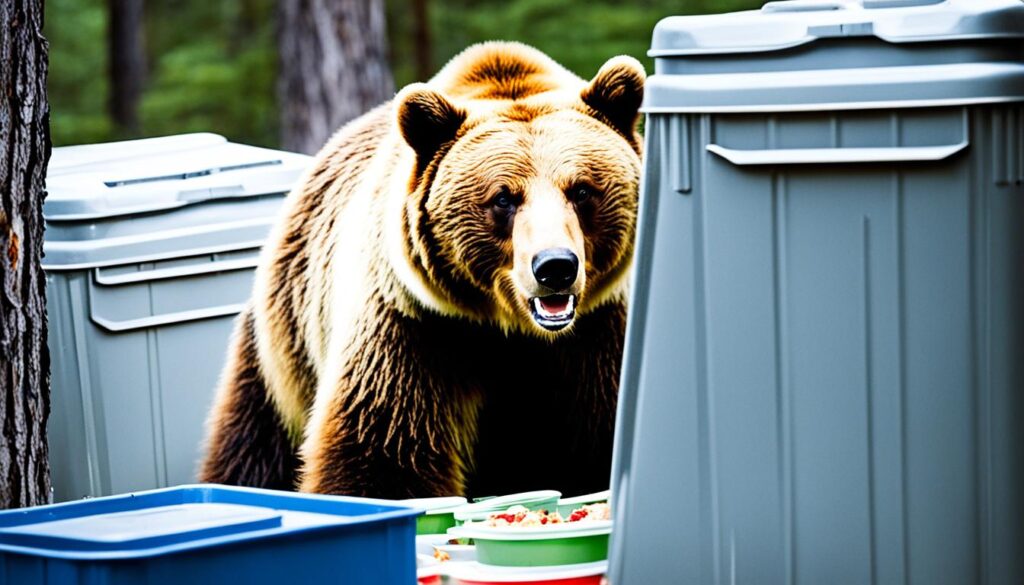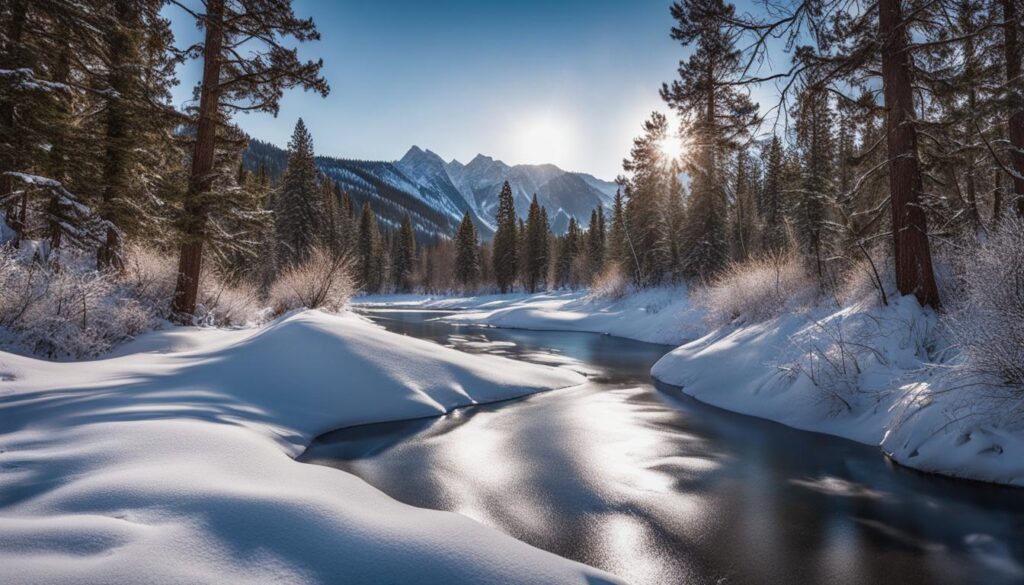When camping, proper food storage is crucial to ensure the freshness and safety of your meals. Improper food storage not only attracts unwanted animals but also poses health risks. So, whether you’re camping in a campground or exploring the backcountry, here are some essential tips to help you store your food effectively.
1. Keep perishable foods in coolers with ice packs or ice. This helps maintain their freshness and prevents bacteria growth.
2. Separate raw meats from other foods to prevent cross-contamination. Use sealed containers or resealable bags to keep them secure.
3. Utilize airtight containers to store dry goods like snacks, cereals, and condiments. This helps to protect them from moisture and pests.
4. Opt for lightweight and portable camping food storage containers that are easy to pack and carry.
5. Consider using vacuum-sealed bags to save space and protect your food from any potential water damage.
Key Takeaways:
- Keeping perishable foods cool with ice or ice packs is crucial for food safety.
- Separate raw meats from other foods to avoid cross-contamination.
- Utilize airtight containers to protect dry goods from moisture and pests.
- Choose lightweight and portable camping food storage containers.
- Consider using vacuum-sealed bags for efficient storage and protection.
Contents
General Food Storage Tips
Proper food storage is essential when camping to prevent animals from accessing your food and to ensure food safety. Here are some general tips to help you store food effectively during your camping trip:
Pack Sealed Containers
When packing food for camping, it’s important to use sealed containers to prevent any leakage and to keep your food fresh. Opt for durable, airtight containers that will keep your food secure during transportation and protect it from insects and animals.
Separate Raw and Cooked Foods
To avoid cross-contamination and the risk of foodborne illnesses, always separate raw and cooked foods. Store them in separate containers or wrap them tightly with plastic wrap or foil. This will help prevent bacteria from spreading and ensure the safety of your meals.
Use Cooler Bags and Ice Packs
Invest in a good quality cooler bag that is well-insulated and can maintain a low temperature. Place ice packs or frozen water bottles inside the cooler bag to keep your food chilled. Remember to pack perishable items, such as dairy products and meat, in the cooler to prevent spoilage.
Utilize Dry Ice for Longer Trips
If you’re planning an extended camping trip, consider using dry ice to keep your food frozen. Dry ice can last longer than regular ice and maintains a much colder temperature. Be sure to handle dry ice with care and follow the manufacturer’s instructions for safe usage.
Store Food in a Shaded Area
When setting up your campsite, choose a shaded area to store your food. Direct sunlight can cause food to spoil quickly, especially perishable items. Keeping your food in a cooler, under a tarp, or in a shaded spot will help maintain its freshness and quality.
Hang Food in Bear-Resistant Bags or Containers
If you’re camping in an area with bears or other wildlife, it’s important to hang your food. Bear-resistant bags or containers are designed to keep your food safe from animals. Follow the guidelines provided for your camping location and ensure that your food is secured and out of reach.
By following these general food storage tips, you can keep your food safe and fresh throughout your camping trip. Remember to always practice proper food handling and to dispose of any leftover food responsibly to minimize environmental impact.
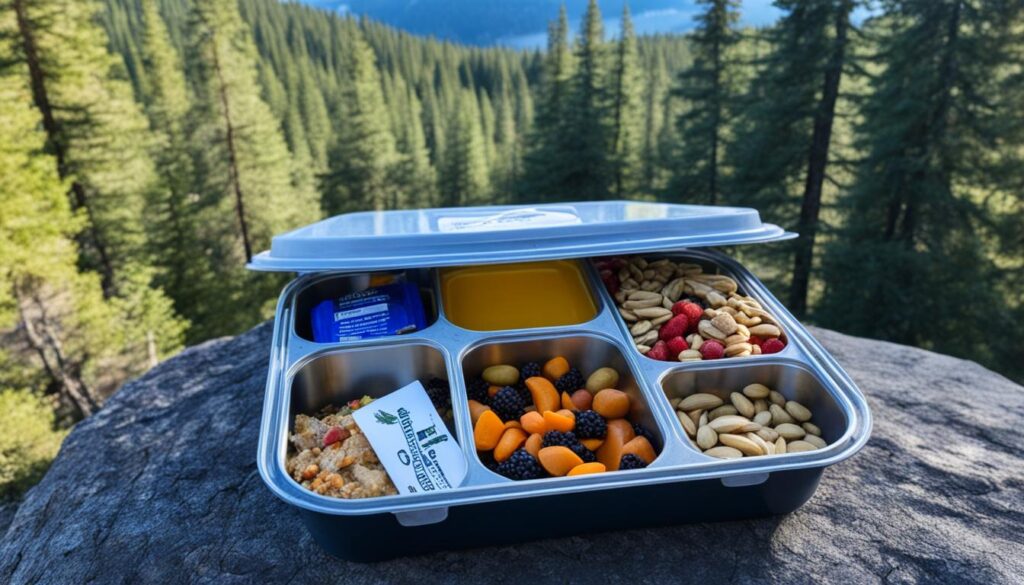
Food Storage in a Campground
When camping in a campground, proper food storage is essential for both convenience and food safety. By following these tips, you can ensure that your camping meals are delicious, organized, and protected from wildlife.
1. Camping Food Storage Containers
Investing in sturdy and reliable camping food storage containers is crucial for keeping your food secure and protected. Look for containers that are airtight, waterproof, and durable enough to withstand outdoor conditions.
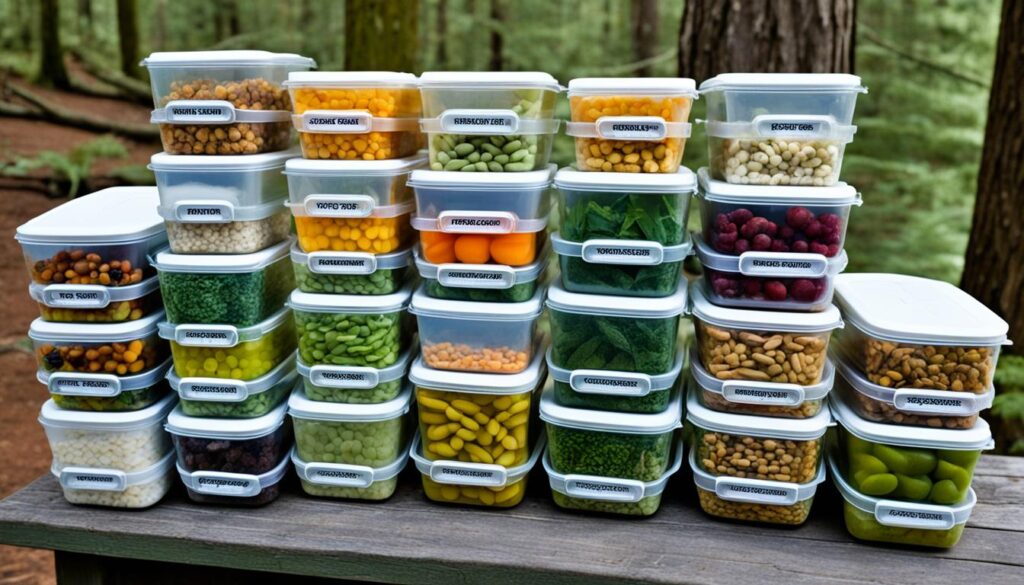
2. Camping Meal Planning and Storage
Proper meal planning is key to efficient food storage while camping. Consider the following tips:
- Create a detailed meal plan that includes all the necessary ingredients for each meal.
- Pre-portion ingredients to avoid carrying excess packaging.
- Label and organize your meals in your camping food storage containers to easily locate them when needed.
- Use resealable bags or containers to store smaller items such as spices or condiments.
3. Food Safety for Camping
Ensuring food safety is paramount when camping. Follow these guidelines:
- Keep raw meat separate from other foods to prevent cross-contamination.
- Store perishable foods, such as meats and dairy products, in a cooler with plenty of ice or ice packs.
- Regularly check the temperature of your cooler to ensure it remains at a safe level (below 40°F or 4°C).
- Dispose of any perishable food that has been left unrefrigerated for more than two hours (one hour if the temperature is above 90°F or 32°C).
Remember, food safety and proper storage practices are essential to prevent foodborne illnesses while camping. By following these tips, you can enjoy your outdoor adventure with peace of mind.
Food Storage in the Backcountry
When camping in the backcountry, it is crucial to prioritize food safety and follow the regulations and recommendations of the specific area you are in. Proper food storage is essential to prevent animals from accessing your food and to ensure the longevity of your camping meals.
1. Use Camping Food Storage Containers
Invest in high-quality camping food storage containers that are durable, airtight, and designed specifically for outdoor use. These containers will keep your food safe from moisture, pests, and other environmental factors. Look for containers that are portable, stackable, and easily fit in your backpack.
2. Plan and Pack Meals in Advance
Prior to your backcountry camping trip, plan your meals and pack them in individual portions. This not only saves space but also makes it easier to store and access your food while camping. Vacuum-sealed bags are ideal for meal planning and storage as they help preserve the freshness of the food while minimizing the space they take up.
3. Utilize Bear Canisters or Bear Bags
In areas where bears are common, it is essential to store your food properly to prevent attracting wildlife. Bear canisters or bear bags are specifically designed to keep your food secure and inaccessible to bears. Follow the instructions provided with these containers to ensure their effectiveness.
4. Hang Your Food in a Bear-Resistant Manner
If bear canisters or bags are not available or permitted in the area where you are camping, hanging your food is another effective method to keep it safe from animals. Use a bear-resistant food hanging system and follow the proper technique to hang your food at least 10 feet above the ground and away from the tree trunk.
5. Store Non-Perishable Foods
Opt for non-perishable foods such as dried fruits, nuts, energy bars, and dehydrated meals when camping in the backcountry. These foods have a longer shelf life and don’t require refrigeration, making them ideal for extended trips where fresh food may not be feasible.
Remember, proper food storage in the backcountry is not only crucial for your safety but also helps maintain the beauty and integrity of the natural environment. Respect the wildlife and follow the guidelines to ensure a safe and enjoyable camping experience.
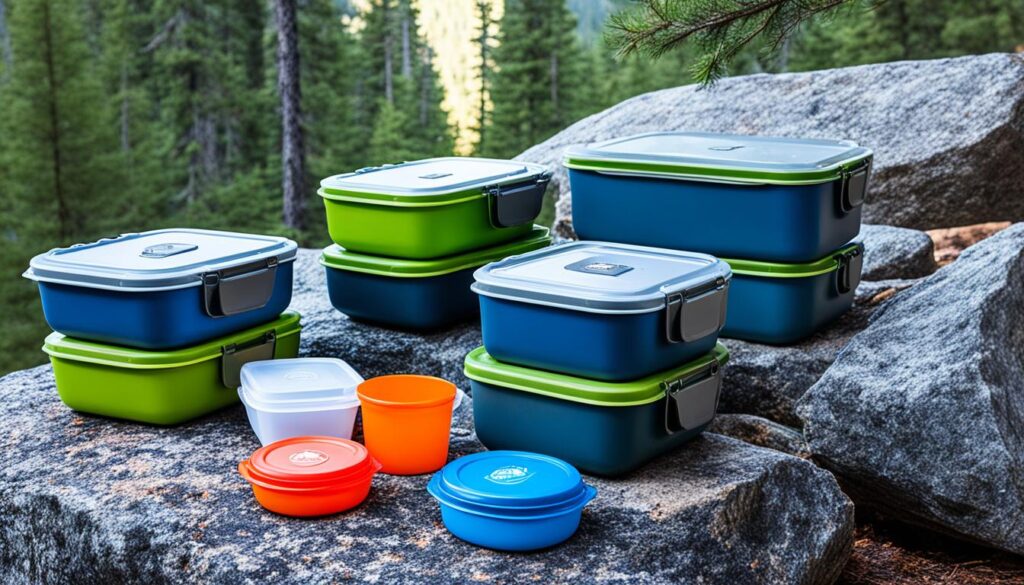
Food Handling Basics
When it comes to camping, proper food handling is essential for maintaining food safety and preventing any health risks. Whether you’re camping in a campground or venturing into the backcountry, following these food handling basics will help you store perishable food safely.
First and foremost, it’s important to store perishable food in appropriate containers, such as coolers or sealed containers. These containers can help maintain the temperature and prevent any cross-contamination. Make sure to separate raw and cooked food to avoid the risk of foodborne illnesses.
Additionally, always keep perishable food items at the right temperature. If you’re camping in a campground with access to electricity, a portable refrigerator or cooler is ideal for keeping food fresh. In the backcountry, use ice packs or freeze water bottles to keep perishables cool. Remember to check the temperature regularly to ensure food stays within a safe range.
Lastly, practicing good hygiene is crucial when handling food during camping trips. Always wash your hands thoroughly with soap and water before preparing or handling any food. It’s also important to clean utensils, cutting boards, and other cooking surfaces to prevent cross-contamination. Dispose of any food waste properly to avoid attracting animals to your campsite.
FAQ
How should I store food when camping?
When camping, it is important to store food properly to keep it fresh and safe. Here are some essential tips for food storage while camping.
What are some general food storage tips for camping?
To prevent animals from accessing your food and to ensure food safety while camping, here are some general food storage tips.
How should I store food in a campground?
When camping in a campground, follow these tips for food storage.
How should I store food in the backcountry?
When camping in the backcountry, it is important to follow the regulations and recommendations of the specific area you are in. Here are some storage methods for the backcountry.
What are some food handling basics for camping?
Proper food handling is crucial to ensure food safety while camping. Here are some food handling basics.
